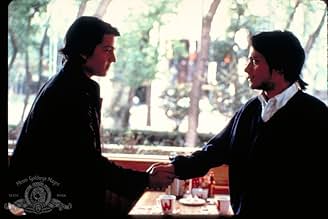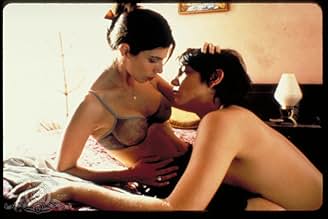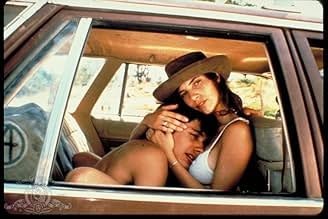No México, dois adolescentes e uma mulher mais velha, se embarcam numa viagem e aprendem sobre a vida, a amizade, o sexo e o outras coisas.No México, dois adolescentes e uma mulher mais velha, se embarcam numa viagem e aprendem sobre a vida, a amizade, o sexo e o outras coisas.No México, dois adolescentes e uma mulher mais velha, se embarcam numa viagem e aprendem sobre a vida, a amizade, o sexo e o outras coisas.
- Direção
- Roteiristas
- Artistas
- Indicado a 1 Oscar
- 39 vitórias e 48 indicações no total
Daniel Giménez Cacho
- Narrator
- (narração)
- Direção
- Roteiristas
- Elenco e equipe completos
- Produção, bilheteria e muito mais no IMDbPro
Avaliações em destaque
10jotix100
This is a very different Mexican film. One in which you can really appreciate the sure hand of director Alfonso Cuaron working at the top of his form with an excellent group of actors, which proves that when someone of this magnitude decides to make a good film about interesting characters in contemporary Mexico, one can expect a fine finished product.
Alfonso and Carlos Cuaron have created people and situations that are very believable. The script is fine. "Y tu mama tambien" is about awakening and about reaching maturity. It's a great Mexican Road movie done with a lot of care.
The Cuarons shows us a slice of life that could happen, not only in that country, but one that is universal. Producers and directors in Mexico should see this film and learn how to do future movies, even though the popular taste runs into the horrible soap operas, popular in Mexican TV. The Cuarons have turned out a magnificent script and have turned away from those popular melodramas that are a staple of the film industry of our neighbor to the South.
Gael Garcia Bernal, who was excellent in Amores Perros, here demonstrates once again what an actor can do, given the right scenario and obviously a lot of freedom to give life to Julio. Diego Luna is also very credible in his portrayal of the son of a rich man on the road to discover himself. Obviously, the underlying theme is that both like each other, but it never comes out, as they both are so closeted and think themselves of being straight in such a macho atmosphere.
Maribel Verdu plays the pivotal role of Luisa. She sees right through the boys, but has to play the part since they are the salvation from her miserable marriage. Here as in other Spanish films, she lets us know she is an actress who likes to take chances. This was the right vehicle for her and she takes advantage of a role that makes her outshine the rest of the cast.
One can only hope more interesting things coming from this director and Mexico's gain is our loss, as it's obvious Mr. Cuaron's incursion into American films have not been as satisfactory as his work here.
Alfonso and Carlos Cuaron have created people and situations that are very believable. The script is fine. "Y tu mama tambien" is about awakening and about reaching maturity. It's a great Mexican Road movie done with a lot of care.
The Cuarons shows us a slice of life that could happen, not only in that country, but one that is universal. Producers and directors in Mexico should see this film and learn how to do future movies, even though the popular taste runs into the horrible soap operas, popular in Mexican TV. The Cuarons have turned out a magnificent script and have turned away from those popular melodramas that are a staple of the film industry of our neighbor to the South.
Gael Garcia Bernal, who was excellent in Amores Perros, here demonstrates once again what an actor can do, given the right scenario and obviously a lot of freedom to give life to Julio. Diego Luna is also very credible in his portrayal of the son of a rich man on the road to discover himself. Obviously, the underlying theme is that both like each other, but it never comes out, as they both are so closeted and think themselves of being straight in such a macho atmosphere.
Maribel Verdu plays the pivotal role of Luisa. She sees right through the boys, but has to play the part since they are the salvation from her miserable marriage. Here as in other Spanish films, she lets us know she is an actress who likes to take chances. This was the right vehicle for her and she takes advantage of a role that makes her outshine the rest of the cast.
One can only hope more interesting things coming from this director and Mexico's gain is our loss, as it's obvious Mr. Cuaron's incursion into American films have not been as satisfactory as his work here.
The two teenage males in this sharply etched film, "Y tu mama tambien," are obsessed with sex and view its pleasures as something akin to joyfully skating across a frozen lake. As the story develops the ice gets thinner and thinner, its incapacity to carry the weight of their fantasies advances faster than their growing inevitable end stop - maturity.
The Mexico of the teenagers and their generally stoned friends is one of affluence and political connectedness. One father belongs to a country club that features one of the biggest private swimming pools I've seen - no film set here (the pool is the scene of a very, ah, unusual depiction of teen horniness). Neither of the lads cares much about the actual political and social issues occurring during their adventures and which are seamlessly integrated into their story. Their futures are a blank to them but a blank untroubled by the need to be concerned or ambitious.
And then arrives the femme fatale, a beautiful, smart but very raunchy just-left-husband gal with whom they take off in a beaten-up old station wagon to find, ostensibly, a secret beach. Of course what the guys have in mind is seduction.
Without a polemical discourse the viewer is carried into the isolation and poverty of much of Mexico as asphalt yields to hard dirt roads leading to barely navigable sand traps. The people they encounter along the way are realized subtly but effectively.
These teens aren't really so likable but they do show occasional promise of growing up, a redeeming feature. This is less a road film than it is a comedy of (very bad) manners. The director and three leading characters have taken raunch to a new and interesting cinematic plane.
While these kids may be a parent's nightmare, they become more complex, and inevitably more insightful, as the film develops. By the end they are very, very different people and in danger of becoming sort of plain vanilla post-teens (whatever the Mexican equivalent of the Japanese "salaryman" is, they may well be launched along that path).
This film is rated "R" but many will wonder how it avoided an "X." Be forewarned. But some of the sex scenes are hilarious - especially if the viewer has ever been a teenager. :)
Cuaron uses voiceovers not so much to explain the story but to quietly show that all lives have "sidebar" events beyond the tale being told, events that can be described in one or two sentences and which illuminate the fullness of a character's journey.
The scenery is gorgeous.
Definitely a different and engrossing story.
The Mexico of the teenagers and their generally stoned friends is one of affluence and political connectedness. One father belongs to a country club that features one of the biggest private swimming pools I've seen - no film set here (the pool is the scene of a very, ah, unusual depiction of teen horniness). Neither of the lads cares much about the actual political and social issues occurring during their adventures and which are seamlessly integrated into their story. Their futures are a blank to them but a blank untroubled by the need to be concerned or ambitious.
And then arrives the femme fatale, a beautiful, smart but very raunchy just-left-husband gal with whom they take off in a beaten-up old station wagon to find, ostensibly, a secret beach. Of course what the guys have in mind is seduction.
Without a polemical discourse the viewer is carried into the isolation and poverty of much of Mexico as asphalt yields to hard dirt roads leading to barely navigable sand traps. The people they encounter along the way are realized subtly but effectively.
These teens aren't really so likable but they do show occasional promise of growing up, a redeeming feature. This is less a road film than it is a comedy of (very bad) manners. The director and three leading characters have taken raunch to a new and interesting cinematic plane.
While these kids may be a parent's nightmare, they become more complex, and inevitably more insightful, as the film develops. By the end they are very, very different people and in danger of becoming sort of plain vanilla post-teens (whatever the Mexican equivalent of the Japanese "salaryman" is, they may well be launched along that path).
This film is rated "R" but many will wonder how it avoided an "X." Be forewarned. But some of the sex scenes are hilarious - especially if the viewer has ever been a teenager. :)
Cuaron uses voiceovers not so much to explain the story but to quietly show that all lives have "sidebar" events beyond the tale being told, events that can be described in one or two sentences and which illuminate the fullness of a character's journey.
The scenery is gorgeous.
Definitely a different and engrossing story.
`Y tu Mama tambien,' a stunning new product of the New Mexican Cinema that is achieving crossover success in the American film market, is a frank, open and uninhibited celebration of teenage sex masterfully directed by Alfonso Cuaron and beautifully enacted by a trio of first-rate performers. Don't miss it provided you are not offended by sometimes-graphic depictions of sexual activity (please note that the film is unrated). The matter-of-fact, unflinching way in which Cuaron films his sex scenes purges them of indecency and helps to bring a new frankness to a subject all too often approached by American filmmakers from the angle of tittering exploitation (wherein the directors and writers seem as adolescent in their attitudes as the characters on the screen).
Not so here. The film centers around two boyhood chums, Tenoch and Julio, just embarking on their careers as university students, who, for one last glorious summer, decide to revel in all the wildness, hedonism and promiscuity that carefree adolescence has to offer (the title of the film is emblematic of the youthful immaturity of the characters). With their girlfriends away in Europe, the two decide to take a road trip through Mexico with Luisa, the attractive young wife of one of Tenoch's stuffed shirt cousins. While on the journey, the three of them not only indulge in all the bizarre sexual hijinks that both the situation and their hormones would lead one to expect, but they also learn a thing or two about life, about relationships and about how sex can be used both to bring people closer together as well as to pull them farther apart. For indeed, one thing the film makes very clear both to the characters and to us is that sex can often be employed as a weapon to wound those we care most about, especially with all the power shifting that takes place even in some of the most non-sexual of relationships. The boys also discover that sex can be used as a sublimation to avoid recognizing what one REALLY wants. This awakening leads to a final scene that is almost heartbreaking in its understated poignancy and pathos.
One of the most unsettling and thereby controversial aspects of the film (and the one that will make it uncomfortable for many in the audience) is that it refuses to take a moralistic stance regarding its characters' behavior. The filmmakers neither approve of nor condemn what these young people do they merely record the events with an attitude of detached objectivity that precludes any finger-wagging disapproval. If the characters learn any `lessons' from their experiences, they do so strictly on a subliminal, subconscious level and the same goes for the audience.
As a director, Cuaron displays a confidence and spirit rarely seen in filmmaking today. Along with his co-writer, Carlos Cuaron, the director has chosen to take an objective, almost documentary-style approach to the material, allowing the scenes to play themselves out in a way that makes them feel realistic, spontaneous and almost unscripted. He uses a shaky, handheld camera much of the time to enhance the immediacy of the experience. We often feel as if we are eavesdropping on the lives of these three fascinating individuals. As a result, not a single moment of the film feels forced, contrived or artificial. (Only the fate of one of the characters seems a bit convenient and contrived). Cuaron is not afraid to let the camera linger on a scene a moment two longer than necessary nor is he afraid to let the camera wander off on its own from time to time, such as when it spontaneously follows a woman into the back of a roadside café to show us the cooks hard at work in the kitchen. Many of the shots even have an elegiac, travelogue feel to them.
Cuaron has been blessed with three outstanding young actors Diego Luna, Gael Garcia and Maribel Verdu who bring his characters to vivid, endearing life. Utterly naturalistic in their every move, gesture and facial expression, the three of them play off each other in such a way that we never doubt for a moment the truth and sincerity of what we are seeing. American actors please take note!
`Y tu Mama tambien' is a stylistic triumph from first moment to last. It has a playful, expansive spirit, as reflected in its openhearted attitude towards sex, its wry humor, its affection for its people and its country, and its visual appeal and inventiveness (Emmanuel Lubezki did the glorious cinematography). The film has heart, soul and chutzpah. What more could a jaded filmgoer want?
Not so here. The film centers around two boyhood chums, Tenoch and Julio, just embarking on their careers as university students, who, for one last glorious summer, decide to revel in all the wildness, hedonism and promiscuity that carefree adolescence has to offer (the title of the film is emblematic of the youthful immaturity of the characters). With their girlfriends away in Europe, the two decide to take a road trip through Mexico with Luisa, the attractive young wife of one of Tenoch's stuffed shirt cousins. While on the journey, the three of them not only indulge in all the bizarre sexual hijinks that both the situation and their hormones would lead one to expect, but they also learn a thing or two about life, about relationships and about how sex can be used both to bring people closer together as well as to pull them farther apart. For indeed, one thing the film makes very clear both to the characters and to us is that sex can often be employed as a weapon to wound those we care most about, especially with all the power shifting that takes place even in some of the most non-sexual of relationships. The boys also discover that sex can be used as a sublimation to avoid recognizing what one REALLY wants. This awakening leads to a final scene that is almost heartbreaking in its understated poignancy and pathos.
One of the most unsettling and thereby controversial aspects of the film (and the one that will make it uncomfortable for many in the audience) is that it refuses to take a moralistic stance regarding its characters' behavior. The filmmakers neither approve of nor condemn what these young people do they merely record the events with an attitude of detached objectivity that precludes any finger-wagging disapproval. If the characters learn any `lessons' from their experiences, they do so strictly on a subliminal, subconscious level and the same goes for the audience.
As a director, Cuaron displays a confidence and spirit rarely seen in filmmaking today. Along with his co-writer, Carlos Cuaron, the director has chosen to take an objective, almost documentary-style approach to the material, allowing the scenes to play themselves out in a way that makes them feel realistic, spontaneous and almost unscripted. He uses a shaky, handheld camera much of the time to enhance the immediacy of the experience. We often feel as if we are eavesdropping on the lives of these three fascinating individuals. As a result, not a single moment of the film feels forced, contrived or artificial. (Only the fate of one of the characters seems a bit convenient and contrived). Cuaron is not afraid to let the camera linger on a scene a moment two longer than necessary nor is he afraid to let the camera wander off on its own from time to time, such as when it spontaneously follows a woman into the back of a roadside café to show us the cooks hard at work in the kitchen. Many of the shots even have an elegiac, travelogue feel to them.
Cuaron has been blessed with three outstanding young actors Diego Luna, Gael Garcia and Maribel Verdu who bring his characters to vivid, endearing life. Utterly naturalistic in their every move, gesture and facial expression, the three of them play off each other in such a way that we never doubt for a moment the truth and sincerity of what we are seeing. American actors please take note!
`Y tu Mama tambien' is a stylistic triumph from first moment to last. It has a playful, expansive spirit, as reflected in its openhearted attitude towards sex, its wry humor, its affection for its people and its country, and its visual appeal and inventiveness (Emmanuel Lubezki did the glorious cinematography). The film has heart, soul and chutzpah. What more could a jaded filmgoer want?
I saw the film twice in 2 days (in original version), and I enjoyed it very much. It is titillating, at times hilarious, touching, candid, serious etc... Roller-coaster of emotions! It is the first film I have seen with Gael Garcia Bernal (Julio in this film), and boy is he great! I love the portrait the film draws of "Teenage Boys lust". The contrast with the mature and controlled Luisa is very interesting. Altogether, I'd recommend it warmly to anyone who enjoys road movies in general and great characters. Obviously it is better in the original, so if you understand a bit of Spanish, don't be put off by the subtitles (you end up reading them really quickly and still enjoy the images...).
People don't get this movie..there is so much more the just coming of age and having sex. It is also about the social disparity in Mexico. That is what all the overdubs were for. Every time there was an voice-over something of meaning was said about the surroundings and the way the average Mexican lives. Don't think of this movie as a story about three people, think of it as a story about a whole nation. I encourage everyone to watch it again. Please pay attention to the scene in the boat. that almost makes me cry. It is so well worded also. And the way the voiceovers just cut abruptly is a great. There are so many small things about this movie that make it so much better then your average Hollywood movie.
Você sabia?
- CuriosidadesAlfonso Cuarón did not want to cast Luna for the role of Tenoch because he was a teen idol and soap opera star. Bernal convinced Cuarón to hire Luna because their strong existing friendship would make the performance of their characters' friendship much easier. Cuarón ultimately hired Luna because he became convinced that their bond would produce a natural and honest performance.
- Erros de gravaçãoIn the scene where Louisa wakes up in the car at the beach, in the shot inside the car, her jeans are torn at the left knee. Subsequent shots show an un-torn pair of jeans.
- Versões alternativasSeveral scenes edited out of the final movie were made available for public viewing on the movie's official Web site. The director claims to have created multiple edits of this film to satisfy censorship rules around the world. According to the director, one of these edits, allegedly intended for Mexican distribution in protest of that country's heavy censorship, runs less than 10 minutes.
- ConexõesEdited into Y tu mamá también: Deleted Scenes (2002)
- Trilhas sonorasGo Shopping
Performed by Bran Van 3000
Contains samples from "Shopping" written by Eek-A-Mouse (as Ripton Hylton) and Jamal-Ski
Published by Plaything Music, Explicit Two & Eek-A-Mouse Music
administered by Plaything Music (ASCAP)
Eek-A-Mouse appears courtesy of Explicit Entertainment, by license from Sunset Boulevard Entertainment
Principais escolhas
Faça login para avaliar e ver a lista de recomendações personalizadas
Detalhes
Bilheteria
- Orçamento
- US$ 2.000.000 (estimativa)
- Faturamento bruto nos EUA e Canadá
- US$ 13.839.658
- Fim de semana de estreia nos EUA e Canadá
- US$ 408.091
- 17 de mar. de 2002
- Faturamento bruto mundial
- US$ 33.616.692
- Tempo de duração1 hora 46 minutos
- Cor
- Mixagem de som
- Proporção
- 1.85 : 1
Contribua para esta página
Sugerir uma alteração ou adicionar conteúdo ausente


![Assistir a Tráiler [OV]](https://m.media-amazon.com/images/M/MV5BZDE5YjEwYTktN2NiYy00ZmZiLTk3YmEtOTYyYzljMTdkMGMzXkEyXkFqcGdeQXRodW1ibmFpbC1pbml0aWFsaXplcg@@._V1_QL75_UX500_CR0)
































